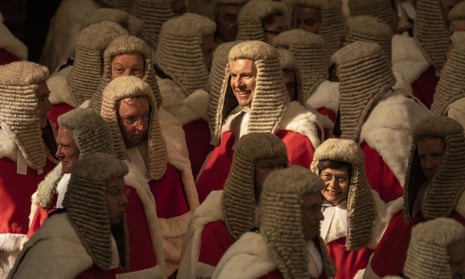Senior judges could be awarded an annual pay rise of almost £60,000, a proposal which has sparked anger among other public sector workers.
A government-commissioned review has reportedly recommended that high court judges should receive a 32% salary hike due to claims of low morale within the judiciary.
The rise would see their pay jump from £181,500 a year to £240,000 – an increase of more than £1,100 a week – if the findings of the Senior Salaries Review Body (SSRB) are accepted.
A combination of long hours and tax changes to pension schemes for high earners was said to have led to a recruitment crisis in the judiciary.
The Ministry of Justice confirmed Theresa May and the justice secretary, David Gauke, had received the SSRB’s report at the end of September. But officials said no decisions had been taken as to whether to accept its recommendations.
A ministry spokesman said: “The government values the work of our world-renowned judiciary, which is why we commissioned this review and are considering its recommendations. We will respond in due course.”
Reports of the recommendation were met with criticism, and sarcasm. One Twitter user said:
Exciting. Looking forward to the Senior Salary Review Body working their way down to teachers, nurses, police, prison staff. They seem very sympathetic to poor recruitment and lack of motivation. That 30% pay rise is just be a matter of time! #Payrise #judges @GOVUK
— Jonathan Hibbard (@murmurmusic) October 12, 2018
Jeremy Marshall, a law lecturer in Liverpool, tweeted:
Paying judges more but failing to improve working conditions is unlikely to improve morale - very few enter the judiciary for the monetary reward https://t.co/ONGLtqjEj8
— Jeremy Marshall (@JezMarshall) October 12, 2018
Trade unions earlier this year condemned pay rises for public sector workers as “derisory” after seven years of a 1% cap on salary increases.
The Treasury announced in July that about a million public sector workers would benefit from the biggest pay rise in almost 10 years. It includes 2.9% for the armed forces and at least 2.75% for prison officers, although the consolidated figures – without bonuses and perks – are lower. Teachers were in line to get up to 3.5%, while junior doctors, specialist doctors, GPs and dentists were allocated at least 2%.
The SSRB, which provides independent advice to the prime minister and ministers on the pay of senior civil servants and others, is chaired by Martin Read, a remuneration consultant who has led government reviews.
In a separate report earlier this year it stated that a survey of senior staff had found that judges reported lower levels of satisfaction with the challenges of their job than senior civil servants and senior figures in the military.
There were low levels of satisfaction among the judiciary in both the 2014 and 2016 surveys – carried out by the UCL Judicial Institute – although they increased slightly between 2014 and 2016.








